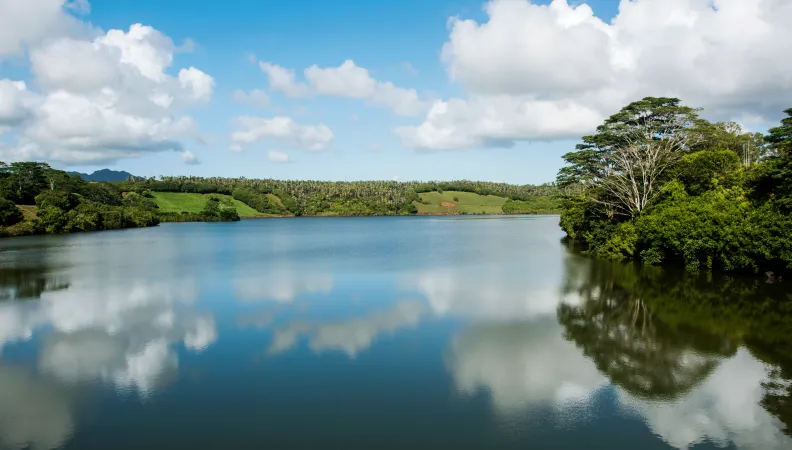Share the page
AFD and Mauritius: 40 years of collaboration on water
Published on

AFD has been working with Mauritius for more than 40 years. One of the main objectives of their partnership has been to develop widespread access to drinking water and sanitation. Here we focus on the “pearl of the Indian Ocean” and a host of initiatives that help combat the effects of climate change, and improve the supply and management of water.
On Rodrigues, a small island of the Republic of Mauritius, 580 km far from the main island, Mauritius, Momus lifts the bucket from his well, dug about 30 years ago. But he won’t be able to quench his thirst: the water is too salty and can be used only to wash his laundry and feed his livestock. He and the inhabitants of Rodrigues face a serious water shortage and suffer regular cuts that last several days in a row.
“We can’t provide enough water with the current infrastructure,” says Jérémy, a technician at the Rodrigues Public Utilities Corporation. Water resources come from surface exploitation of the rare rivers there, rainwater recovery, exploitation of groundwater by drilling, and expensive desalination of seawater.
Yet that still doesn’t provide enough: Rodrigues produces about 4,800 m3 of water per day, while daily estimated demand is 12,000 m3 and will rise to even 20,000 m3 in 2040.
In contrast, 99.7% of the population of the island of Mauritius enjoys access to household water for at least six hours per day, compared to 75% in the 1990s. Nonetheless, there are still water shortages is some areas. Corinne, a resident of Bambous Virieux, on the west coast, depends on water deliveries from tankers. “We live on a day-to-day basis,” she says, “and I never know when they’ll arrive to fill our tanks.”
“We live on a day-to-day basis, never knowing when the tankers will arrive to fill our tanks.” Corinne, resident of Bambous Virieux.
Shortages of running water are largely due to a faulty supply network. More than 50% of the precious liquid produced on the island is lost before reaching households. Laëtitia Habchi, Director of AFD in Mauritius, notes that “Rodrigues worries about water availability, but Mauritius suffers a problem of water management.”
Promoting access to water and its sustainable management
In response, the Mauritian Central Water Authority embarked on a large-scale program in the early 1990s to repair and modernize its infrastructure. Thanks to AFD support, the capacity of the Piton du Milieu treatment plant, in the center of the island, has increased from 10,000 to 27,000 m3 per day.
Similarly, the La Nicolière station, further north, can now process 70,000 m3 per day, compared to 10,000 m3 previously. AFD has also supported the construction of wastewater treatment plants, such as the Grand Baie plant in the northwest of the island.
Adapting to climate change
Following the floods of 2013 and 2017, the Mauritian government created a new body dedicated to this issue, the Land Drainage Authority. With the support of AFD via its AdaptAction program, a stormwater management plan was developed. The plan calls for the implementation of nature-based solutions, i.e., based on the services that ecosystems can provide to reduce the country’s vulnerability to floods.
With agriculture consuming 48% of the water supply, AFD has had to work on that sector too, especially since there was much room for improvement. The main irrigation method for fields, for example, used to be based on automatic watering, which consumed too much water. The Mauritian government therefore launched an ambitious program, partially financed by AFD, to modernize the irrigation network.
As a result, farmers in the north of the island are now using a drip system, covering hundreds of hectares, and in the eastern Belle Mare region a low-pressure irrigation system has been established. In both cases, water consumption has been significantly reduced and crop yields have increased, to the delight of small-scale farmers.
Namah, a local farmer, recalls the constant anxiety of his parents, who had to pay for too much water. “Today, I produce more with the same amount,” he says. Niven, technical advisor with the Irrigation Authority of Mauritius, adds that AFD’s constant commitment is one of the reasons for the success of the irrigation program in the region.
40 years of support
While AFD has supported Mauritius for 40 years, a lot remains to be done. Less than 20% of the country’s wastewater is currently treated, for instance. But a remedy is in the works: a historic agreement was signed in 2023, by which AFD is providing Mauritius and Rodrigues with a loan of €200 million, combined with a grant of €2 million over the 2024-2027 period.
“This effort will involve the entire sector, with the main objective of improving service for the people of Mauritius and Rodrigues,” says Jahajeeah Doumeney, Technical Director at the Ministry of Energy and Public Utilities.
Additionally, in 2022, the Rodrigues Regional Assembly set up the Rodrigues Public Utilities Corporation. It is led by Claude Wong So, in charge of the Water project, who points out that Rodrigues isn’t lacking in resources: “There are water tables, but they are still unexplored and underutilized.”
That’s why AFD has commissioned an in-depth study on this subject from the French Geological Survey (BRGM). Over the next three years, the latter will work on mapping that will identify the best locations for new drilling (financing of €1.3 million).
All these measures have the same goal: to achieve the United Nations Sustainable Development Goal (SDG) No.6, which aims to “ensure availability and sustainable management of water and sanitation for all” by 2030. Today, residents consume an average of 170 liters per day per person, a consumption level that is expected to further increase nationally.
All photos by © Paul Choy
